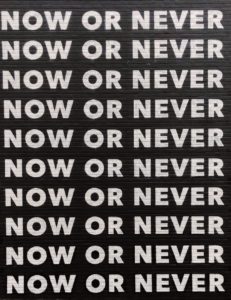Stop trying to fix your entire life at once!!


Goals and aspirations have a unique position within our modern society. Whether we are consciously aware of it or not, there is a constant push to perform and succeed in our daily lives. We know from research that having goals, and working towards achieving them, is important and can lead to a sense of accomplishment, boosting our mood and overall sense of well-being. Unfortunately, that same research has also shown, time and again, that few people ever achieve their lofty goals; this failure can lead us to feel frustrated, angry or even hopeless. In my work as a psychologist, this topic comes up regularly in sessions and my guidance is always the same: Stop Trying to Fix Your Entire Life at Once.
Let me explain. When we set our goals, we often do so with the best of intentions. The problem with lots of the goals that we set, is that they are often related to others and thus, outside of our direct control. As an example, let’s say that I want to work towards repairing a relationship in my life over the next year. This is a fantastic goal, but is it achievable? One thing that I need everyone to remember this year is “I only ever have control over myself.” This may sound redundant and ridiculous, and I promise that I am not trying to insult your intelligence, but it is amazing how many times we forget this. In the fictional goal above for example, I can work towards doing everything right, but if that same dedication isn’t reciprocated (or if that person isn’t interested in the relationship any longer), there is very little that I can do to change that. My goal is thus thwarted, and the cascade of negative emotions ensues, making me feel worse.
Unfortunately, the situation referenced above is very common and can lead to a sense of apathy regarding the importance of goals; after all, why set a goal if I can’t ever achieve it? Wouldn’t it be better to just not set a goal period? Quite often, when I first meet someone for individual therapy, they are so overwhelmed with their life situation and difficult emotions that I often don’t even get an opportunity to speak; I just sit there and let it come out. To be sure, these folks are trying their best to manage in life, however life has a way of seeming to continue to beat us down despite our best efforts; like a boxer in the ring who doesn’t know where the next punch is going to come from, we feel exasperated, exhausted, and hopeless. This post is about what to do next.
What is Broken Windows Theory?


The theory itself was first devised in 1982 by sociologists James Q. Wilson and George Kelling. It was applied in a radical way in order to help make New York a safer city despite rising crime rates in the 1980’s and 90’s. The theory, in oversimplified terms, goes that one broken window in an abandoned building will soon turn into many broken windows; this in turn will lead to graffiti, then to muggings, car thefts and so on. The general idea being that something small can lead to something much worse in the long run. City officials decided to take radical action and were interested in seeing if the relationship above worked in reverse. Instead of trying to change everything at once, they started small and worked towards improving the subway; money was directed towards repairing windows and cleaning graffiti one car at a time. As they accomplished this goal, they slowly started to include more rail lines until all the trains in the city were clean. They started to notice an interesting pattern; subway crime of all kinds plummeted. City officials then moved above ground and began to clean up graffiti in the city at large, and amazingly, crime continued to fall across the board.
What does all of this have to do with our lives? Broken windows theory illustrates an important point: small successes can add up to major accomplishments over time. If, like the city officials, we try to change everything in our life at once, we often fail. If, by contrast, we focus on setting small personal goals to change ourselves (because we can’t change anyone else) we are much more likely to change the greater picture of our lives in a positive way.
What to do now!


Stop trying to fix every negative thing in your life at once and recognize that the only person you ever have control over is you. Shrink the circle of problems and start to focus on improving yourself both physically (i.e., eating healthier, exercising regularly and focusing on sleep) and emotionally (avoid/limit contact with negative sources). Remember that it’s okay to keep some relationships in your life at arms distance. Why start by focusing on yourself? It’s very difficult to make lasting changes if we are struggling with our own self-care.
Seek out the assistance of professionals including doctors, psychologists or counsellors etc. These professionals can help to guide and support you while you make some of the required changes. Then start slow; set small, achievable goals for yourself. When you start to achieve these, it will motivate you to continue to set goals (and accomplish them); in this way it almost becomes a perpetual motion machine. Also remember that setbacks are normal and a part of life. If you don’t experience immediate success, spend some time in reflection about what you could have done differently and, perhaps, set yourself a slightly easier goal. Remember the lesson from Broken Windows Theory. Start with changing what we have direct control over (i.e., ourselves) and then slowly work outwards.
I hope that you will find these suggestions to be of benefit. Please feel free to contact me with any questions or comments at brandon@www.elevationprocess.com.
Thanks for reading and have a great day!
Join our newsletter: